
James O'Brien 10am - 1pm
23 January 2021, 12:41 | Updated: 23 January 2021, 23:11
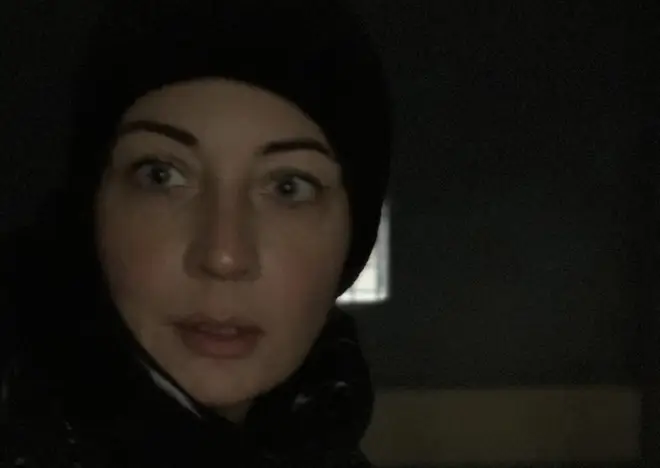
Around 2,600 people have been arrested after protests erupted in more than 60 Russian cities to demand the release of opposition leader Alexei Navalny, the Kremlin's most prominent foe.
The 44-year-old was arrested on January 17 when he returned to Moscow from Germany, where he had spent five months recovering from severe nerve-agent poisoning that he blames on the Kremlin.
The protests, which took place in temperatures as low as minus 50C in some place, highlighted how Navalny's influence stretches far beyond the political and cultural centres of Moscow and St Petersburg.
In Moscow, an estimated 15,000 protesters gathered in and around Pushkin Square in the city centre, where clashes with police broke out and demonstrators were dragged off by riot officers to police buses and detention trucks. Some activists were beaten with police batons.
Navalny's wife Yulia Navalnaya was also detained, posting a picture on Instagram which appears to show her in the back of a police van.
She posted in Russian: "Forgive the poor photo quality, the lighting is bad in the paddy wagon."
Also arrested was Lyubov Sobol, a lawyer for the Russian opposition leader. She was charged with inciting an unlawful protest and reportedly fined 250,000 roubles, around £2,500.
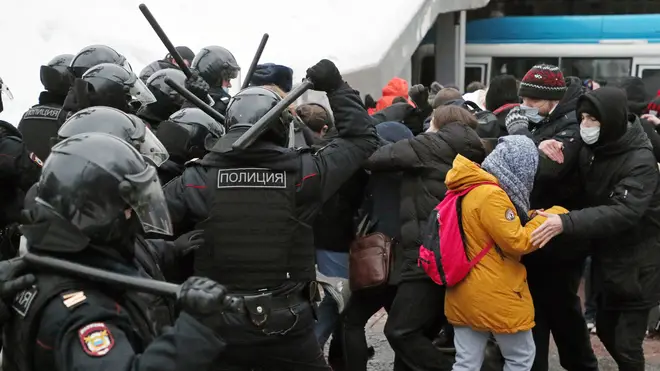
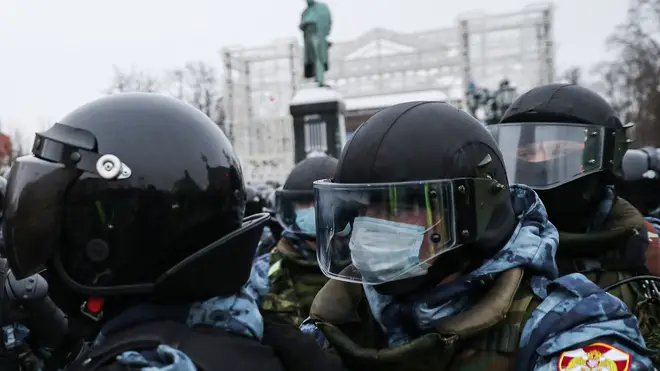
Police eventually pushed demonstrators out of the square. Thousands then regrouped along a wide boulevard about half a mile away, many of them throwing snowballs at the police before dispersing.
Some demonstrators later went to protest near the jail where Navalny is being held. Police made an undetermined number of arrests there.
The protests stretched across Russia's vast territory, from the island city of Yuzhno-Sakhalinsk north of Japan and the eastern Siberian city of Yakutsk, where temperatures plunged to minus 50C, to the more populous European cities.
The range demonstrated how Navalny and his anti-corruption campaign have built an extensive network of support despite official government repression and being routinely ignored by state media.
The OVD-Info group, which monitors political arrests, said at least 1,045 people were detained in Moscow and more than 375 at another large demonstration in St Petersburg.
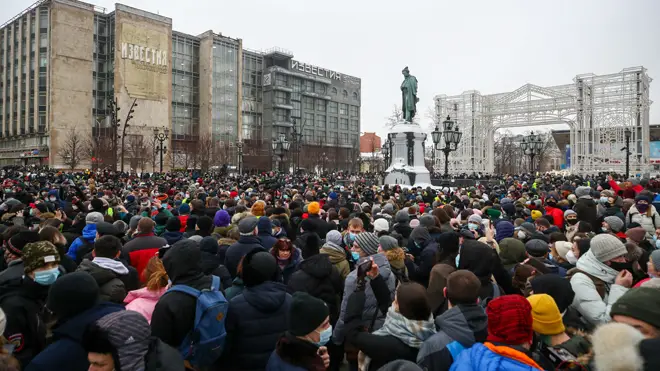
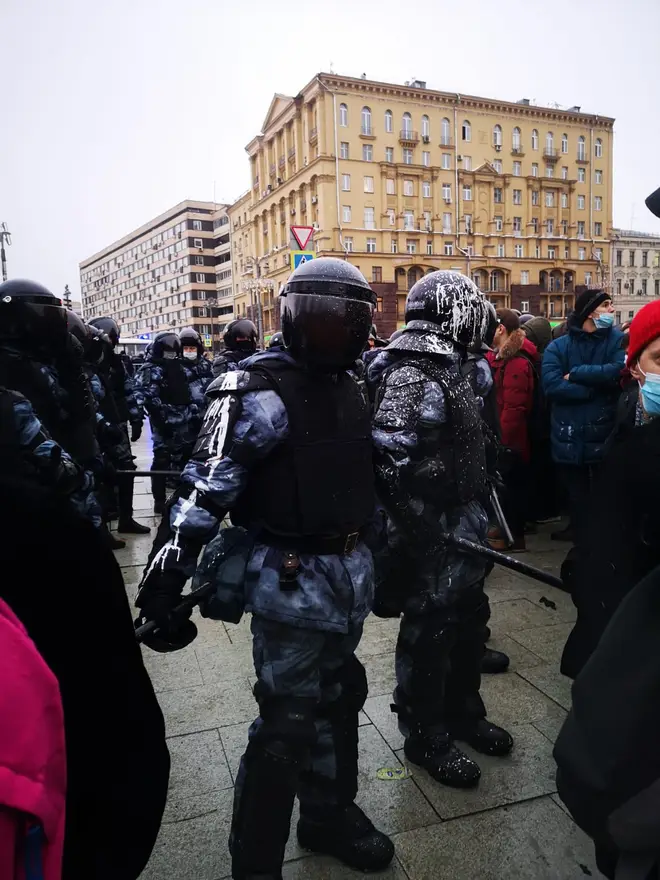
Overall, it said 2,662 people had been arrested in some 90 cities, revising the count downward from its earlier report of 3,445. The group, which conducts its count through regional associates and runs a hotline for information, did not give an explanation for its revision, and Russian police did not provide arrest figures.
Undeterred, Navalny's supporters have called for fresh protests next weekend.
Russian authorities said Navalny's stay in Germany violated the terms of a suspended sentence in a criminal conviction in a case that Mr Navalny claims was illegitimate.
He is due to appear in court in early February to determine if he will serve the three-and-a-half-year sentence in prison.
More than 350 people were detained in protests in the Far East and Siberia, according to the arrests-monitoring group OVD-Info, with 863 arrested by late afternoon in Moscow.
Several thousand people turned out for a protest in Yekaterinburg, Russia's fourth-largest city, and demonstrations took place in the Pacific port city of Vladivostok, the island city of Yuzhno-Sakhalinsk, and the country's third-largest city of Novosibirsk, among other locations.
Thirteen people were reported to have been arrested at the protest in Yakutsk, a city in eastern Siberia where the temperature was minus 50C (minus 58F).

Pro-Navalny protester explains demonstrations in Moscow
In Moscow, tens of thousands converged on central Pushkin Square as a police public-address system blared messages telling them not to gather closely because of Covid-19 concerns and warning that the protest is unlawful.
Helmeted riot officers sporadically grabbed participants and pushed them into police buses. Another large protest in St Petersburg saw more than 100 arrests.
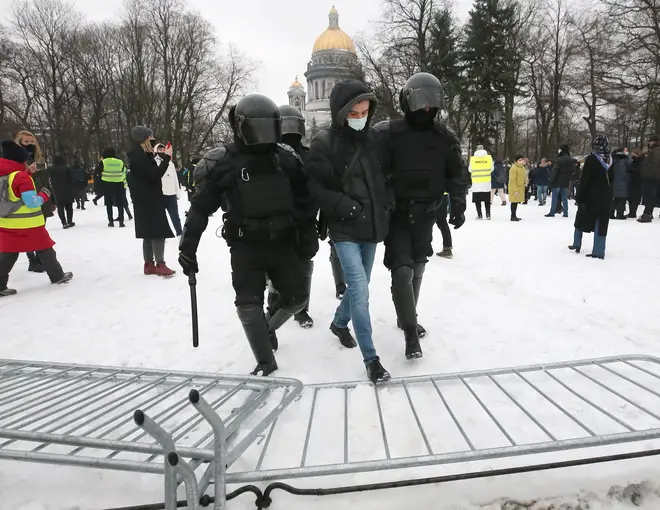
On Thursday, Moscow police arrested three top Navalny associates, two of whom were later jailed for periods of nine and 10 days.
Mr Navalny fell into a coma while on board a domestic flight from Siberia to Moscow on August 20. He had been transferred from a hospital in Siberia to one in Berlin two days later.
Laboratories in Germany, France and Sweden, and tests by the Organisation for the Prohibition of Chemical Weapons, established that he had been exposed to a Soviet-era Novichok nerve agent.
Russian authorities insisted that the doctors who treated Mr Navalny in Siberia before he was airlifted to Germany found no traces of poison and have challenged German officials to provide proof of his poisoning.
Russia refused to open a criminal inquiry, citing a lack of evidence that Mr Navalny was poisoned.
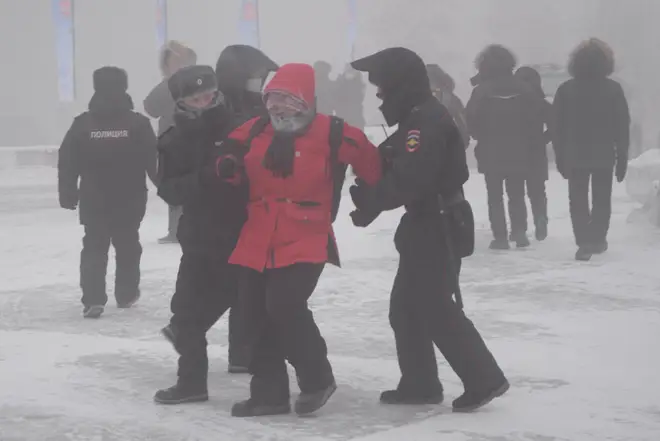
Last month, Mr Navalny released a recording of a phone call he said he made to a man he described as an alleged member of a group of officers of the Federal Security Service, or FSB, who purportedly poisoned him in August and then tried to cover it up.
The FSB dismissed the recording as fake.
Mr Navalny has been a thorn in the Kremlin's side for a decade.
He has been jailed repeatedly in connection with protests and has twice been convicted of financial misdeeds in cases that he said were politically motivated.
He suffered significant eye damage when an assailant threw disinfectant into his face, and was taken from jail to hospital in 2019 with an illness that authorities said was an allergic reaction but that many suspected was poisoning.